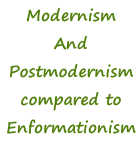



 NEXT
NEXT
 BACK
BACK
 Forum
Forum


Philosophical musings on Quanta & Qualia; Materialism & Spiritualism; Science & Religion; Pragmatism & Idealism, etc.




Postmodern Irony
Tongue-
Architecture
Post 26. 03/30/2018
The Postmodern Critique
Of Enlightenment & Modern Worldviews
The Enlightenment Now book-
Whereas, the Enlightenment worldview said that ideally reason should rule, the postmodern analysis observed that, in practice, power still over-
In that sense, PM is merely a continution of the Enlightenment empowerment of the "little man". At first, the postmodern critique, was mostly aimed at political & religious bastions of power. But it also began to dismiss Science as a tool of political propaganda, and portrayed it as a quasi-
Postmodernism, like Marxism, was a valid critique of entrenched power elites, but its uncompromising remedies were essentially religious & irrational, rather than scientific & pragmatic; based on rigid faith in a paradigm, not flexible factual information. Whereas Scientific paradigms gradually evolve, the Postmodern paradigm entails revolutionary changes. Moreover, like Marxism, PM seemed to serve its academic literate elites as a secular religion. Although the masses may not always accept the atheism of their leaders, they willingly adopt the leftist language to use against their oppressors. Just as the Marxist economic critique forced Capitalism to adopt some humanistic values to regulate its economic engine, the Postmodern social deconstruction has prompted stratified societies to expand their hierarchies to include formerly outcaste minorities. So now, in some circles, it's cool to be Queer.
Post 26 continued . . . click Next
2. Hegelian :
Philosopher Hegel’s theory of a dialectic pattern in history observed that political, religious, and philosophical debates tend to be settled, not by mutual consent, but by attempts at total annihilation.
The previous dominant worldview, the “Thesis”, is contrasted with a diametrically opposite ”Anti-
That hard-
If humans don’t learn the art of compromise, pitiless Nature, or brutal Hegelian History will do it for us. But the blood will be on our hands.


1. Both Wingers :
PM is typically classified as a leftist worldview, and its right-
This centrist approach should be inclusive, but realistic about natural hierarchies in humanity. It should allow just enough of the individual motivation aspect of Capitalism, but restrained by the collective interests Socialism.
• The Postmodern Critique
click here for popup
• Linguistic Critique :
Postmodernism primarily analyses language, which is not the real power in the world, but merely a theoretical description of it. Language & names merely symbolize power relation-
That may be why PM was mostly relegated to feckless academia, instead of ruthless politics. Karl Marx was an armchair academic, but he admitted that it was not sufficient to criticize the establishment. The point of the critique is to change the structure of the system from within, if possible, or from without if necessary.
• Modernism :
Science replaces Scripture as a source of information about how the world works

The BothAnd worldview is a moderate blend of these opposing paradigms. 1. Both Objectivity and Subjectivity, both Reason and Intuition.
2. Both Autonomy and Interdependence; a man’s castle is not an island.
3. Both Individualism and Socialism; both me and us.
4. Both Free-


